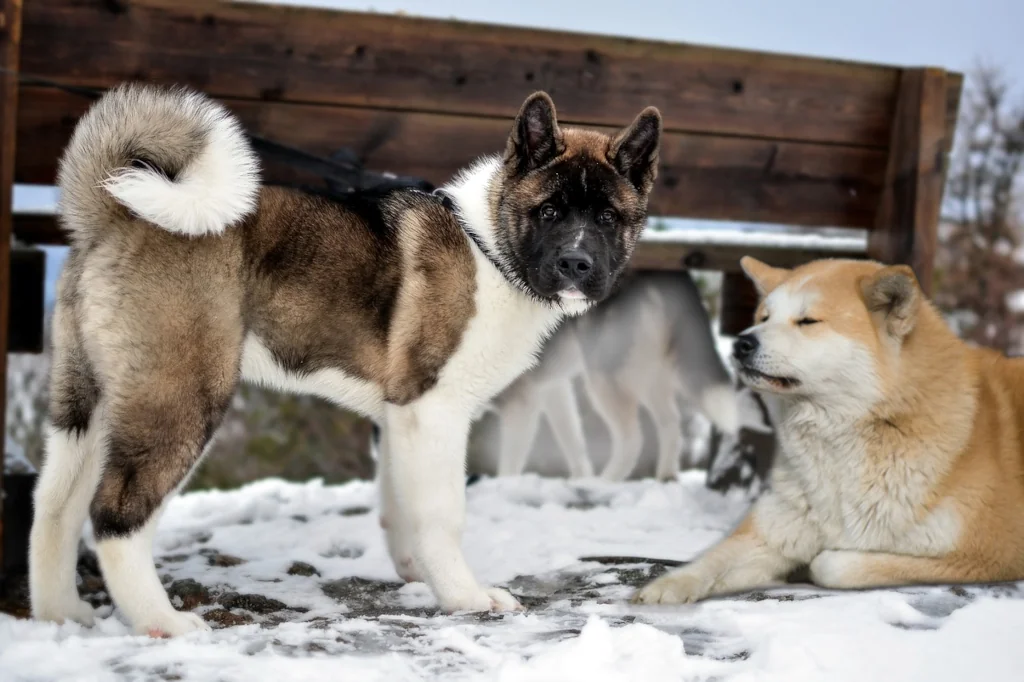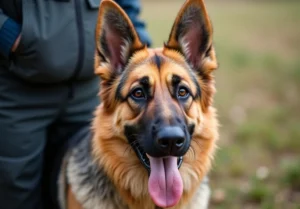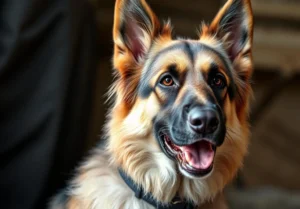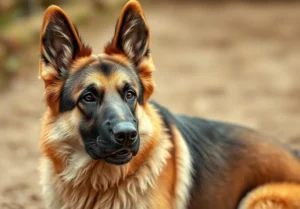Disclosure: We may earn a commission from helpful, relevant links in our content. No cost to you. See our privacy policy.
The flashing red and blue lights, the sense of security, the instant respect – police dogs are not just ordinary canines, they are super canines.
But have you ever wondered what traits qualify a dog for this exceptional duty? You’ve probably heard of the common breeds like German Shepherds and Belgian Malinois, but have you ever considered an Akita for the role?
In this blog post, we’ll explore what makes a good police dog, we’ll dive into the potential of the Akita breed for police work, and provide practical advice on training your Akita. Ready to unlock the potential of Akitas? Let’s dive in!

What Makes a Good Police Dog?
A good police dog isn’t just about brawn, it’s about brains too.
These canines need to have a unique combination of traits that equip them for the demanding and dynamic environment of police work.
- Firstly, intelligence and trainability are paramount – a police dog must be able to learn and perform complex tasks.
- Secondly, a strong drive to work, whether it’s the drive to play, hunt, or protect, is an essential motivating factor.
- Lastly, they need to be physically robust and adaptable, capable of working in various climates and situations.
Understanding these attributes sets the foundation for identifying potential breeds for police work, and might lead us to some surprising candidates.
Can an Akita Make a Good Police Dog?
Akitas, renowned for their loyalty, courage, and physical prowess, are not your typical police dogs. Yet, these unique traits can make them suitable candidates for certain roles within law enforcement.
With their strong protective instincts, Akitas can excel in roles that require guarding or protecting. They are intelligent and trainable, although their independent nature requires a patient and skilled handler.
Their impressive physical strength and resilience make them capable of handling physically demanding tasks.
While they may not be the traditional choice, Akitas certainly possess some key attributes that could be harnessed for police work, adding a unique flavor to the K-9 unit. But, as with any breed, their suitability would depend on individual temperaments and the specific demands of their intended roles.
What Makes Akitas Strong Guard Dogs?
Akitas are like unsung heroes when it comes to guard dog abilities.
They have an instinctual protective streak combined with an impressive physical presence, but there’s more to their guarding prowess than just that.
- Akitas have an astute sense of intuition, which allows them to discern potential threats. This innate sensitivity helps them to react accurately in threatening scenarios, not just barking at every passing leaf.
- Also, Akitas are known for their territorial nature. They form strong bonds with their family and home, making them excellent protectors of both.
- But, what’s unique about them is their silent guarding style. Unlike other guard dogs that alarm with loud barks, an Akita prefers to stand its ground quietly, often surprising an intruder with their silent but assertive presence.
It’s this combination of traits, some more evident and others subtle, that make Akitas uniquely equipped as guard dogs.
Akitas and Fearlessness: What Does This Mean?
Akitas and fearlessness go hand in hand. These dogs are known for their courage, and they will not hesitate to face even the most intimidating of threats.
But what does this mean in real terms for an owner? Firstly, it means you have a dog that will go the extra mile to protect you and your home. However, this bravery should not be mistaken for recklessness. Akitas are discerning, only choosing to engage when they feel it’s necessary.
This fearlessness also comes with a unique quirk. Akitas are typically quiet dogs, but their courage can translate into a quiet confidence, leading to a silent but assertive protective style. This is a trait not commonly emphasized in dog literature but it’s important for potential owners to understand.
A fearless Akita might not always bark a warning, but rest assured, they are ready to act when the situation calls for it.
Understanding an Akita’s Bite Force
Diving into the world of canine capabilities, it’s important to grasp the concept of bite force.
Specifically, for Akitas, their bite force measures a hefty 350-400 PSI (Pound per Square Inch), which is considerably powerful. This strength originates from their history as hunting dogs in Japan, bred to take down wild boars and deer.
While this might sound intimidating, it doesn’t imply that Akitas are prone to biting. Rather, it’s an attestation to their capability to defend and protect when necessary. Hence, this high bite force, coupled with a disciplined training regimen, makes Akitas formidable candidates for roles like police or guard dogs.
Related: Can Pitbulls Be Police Dogs
How to Train an Akita for a Police Role
Training an Akita for a police role requires time, patience, and a step-by-step approach. Here’s a practical guide to help you along the way:
- Start with basic obedience training. Commands like ‘sit‘, ‘stay‘, and ‘leave it‘ form the foundation of all further training. Start this when your Akita is young and eager to learn.
- Prioritize socialization. Expose your Akita to different environments, people, and other dogs to enhance their adaptability. This can help them get used to varied situations they might encounter in police work.
- Undertake advanced police dog training. This includes specific areas like tracking, suspect apprehension, and search and rescue. Unless you’re an experienced trainer, consider professional help or a reputable police K9 training program.
- Unique Tip. Akitas are known for their silent, calm demeanor. Use this to your advantage by incorporating ‘quiet’ commands into their training. This can help them maintain stealth during critical operations, a skill often overlooked but highly valuable in a police dog.
Remember, training a dog for police work isn’t quick. Patience, consistency, and positive reinforcement are vital. Also, always ensure your Akita’s wellbeing is central to the process.
Recommended Tools for Training Akitas
Training an Akita for a police role can be more effective with the right tools at your disposal. Here are a few items you might find useful:
- The Pupford Freeze-Dried Training Treats are bite-sized and perfect for rewarding your Akita during training sessions.
- The KONG Extreme Dog Toy can be an excellent tool for developing your Akita’s bite strength and resilience, given their strong jaw force.
- Also, consider the Tug Toy with Strong Handles, to help your Akita develop skills necessary for suspect apprehension.
Remember, all these tools are most effective when paired with a consistent, positive reinforcement training plan.
In Conclusion
As we round off our exploration of Akitas in police roles, let’s remember that Akitas, while not the traditional choice, can bring their own unique blend of skills to a police unit. These canines, known for their loyalty, courage, and quiet strength, can truly shine with the right training and care.
Whether you’re a dog handler looking to train your Akita for police work or a dog lover intrigued by the potentials of this breed, let’s celebrate the diverse capabilities these noble creatures possess.
Related: Why Aren’t Dobermans Used as Police Dogs
FAQs
What tasks can Akitas perform in police work?
Akitas can be trained to perform various tasks in police work, including suspect apprehension, tracking, search and rescue, and even narcotics detection due to their keen sense of smell.
Can I train my Akita for police work at home?
While basic obedience and socialization can be done at home, training an Akita for specific police tasks requires advanced skills and experience. It’s recommended to seek professional assistance or enroll your Akita in a reputable police K9 training program.
Are Akitas suitable for police work in all climates?
Akitas have a thick double coat that helps them withstand cold climates excellently. However, they can also adapt to warmer climates with proper care and hydration, making them versatile for police work in various weather conditions.
Do Akitas work better alone or in police dog teams?
Akitas, known for their independent nature, often excel in roles where they work independently. However, with proper socialization and training, they can also function well in police dog teams.
Alex, a passionate animal lover, has experience in training and understanding animal behavior. As a proud pet parent to two dogs and three cats, he founded AnimalReport.net to share insights from animal experts and expand his knowledge of the animal kingdom.




